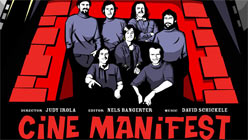Hey kids, let’s put on a Marxist film collective! That, more or less, was a founding principle of Cine Manifest, the seven-member strong (and sometimes less strong) assembly of San Francisco filmmakers working from 1972 through 1978 to make politically potent movies that regular people could tolerate.
Judy Irola’s breezy personal documentary Cine Manifest, new to DVD this week, brings a fond, proud and wistful recollection of the group’s formation and probably inevitable dissolution. Together they shared credit for two earnestly humane and deservedly acclaimed features, Over-Under, Sideways Down (1977) and Northern Lights (1978), plus several shorter films of zany vitality celebrating each other’s birthdays, a good deal of infighting, and many, many talking-points memoranda.
The gang consisted of Eugene Corr, Peter Gessner, John Hanson, Stephen Lighthill, Rob Nilsson, Steve Wax and Irola — the only woman, whose membership the others had at first denied but reconsidered when she wrote them a note explaining how dumb that was of them.
Later, although the collective’s budgetary constraints compelled Irola to give up her Ms. Magazine subscription, she was able to offer much-needed feedback on the portrayal of women in the lads’ scripts, to point out that somebody had to clean the toilets (“I didn’t join so I could be your maid. Love & kisses, Judy”), and to provide the essential, starkly gorgeous black-and-white cinematography of Northern Lights, a docudrama about Scandinavian immigrant farmers in North Dakota co-written and co-directed by Hanson and Nilsson.
Cine Manifest, the movie, is a touch overlong and lacks external context; it feels like a private (which is not to say exclusive) pet project, perhaps better suited to a featurette than its own full DVD. But it’s an important testimony on behalf of Bay Area artistic ideals, which benefits from the perspective, grace, and good humor of hindsight.


